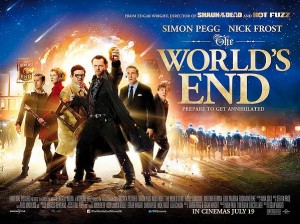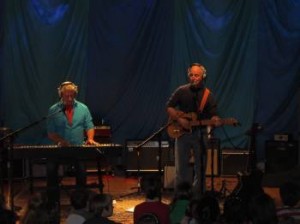Interview: “The World’s End” Composer Steven Price
Posted on August 21, 2013 at 5:12 pm
The fifth and best end of the world movie of the summer is called “The World’s End,” and it is the last in what is now being called the Cornetto Trilogy from Simon Pegg, Nick Frost, and co-writer and director Edgar Wright. “Shaun of the Dead” was a zom-rom-com (zombie romantic comedy) that featured red Cornetto ice cream. “Hot Fuzz,” a send-up of over-the-top action films, featured blue. Stay through the credits of this one to find out what flavor, or, I guess I should say, flavour since it is British, appears in this one.
I spoke to Steven Price, who composed the score.
You were writing for the wonderful Pegg/Frost/Wright trio and the movie has robot aliens! Was this the most fun movie project ever?
It’s certainly up there! It was an amazing gift for someone who does music to play with because you’ve got the big action sequences and the sci-fi mystery stuff and relationship scenes. So it’s everything you might want to do as a composer and the team involved were pretty good as well.
How did you get involved?
I met Edgar quite a while ago now. The first film I worked on was “Scott Pilgrim vs. the World.” It is wonderful to work with him because everything is so well-planned so choreographed, but he is very, very open to different ways of doing things, so as a collaborator he is great fun. Edgar exec produced “Attack the Block,” which was my first feature film, so when this one came up, and he explained what he had in mind, it was an exciting time, really. The characters were all friends and getting out of school. Now they’ve all moved on with their lives, with wives and kids, except for Gary King, who was one of the most popular ones in school and never got over that night. Everything seems to have gone wrong for him so he persuades them to do this pub crawl but none of them really want to. You can’t go back, really. That’s the main theme.
This is a comedy action sci-fi film. How do you set the mood for that musically?
One of the first things that Edgar and I talked about was that everything musically we would do would be serious because for the characters none of it is a joke for them. Whenever we did err on the side of doing anything at all funny you realize very soon that it doesn’t help at all. We took it incredibly seriously and the action music was meant to drive along what was happening. The performances in the fight sequences are so amazing and convincing and the actors genuinely did it themselves. It’s not like there are a lot of cutaway for stunt people. It’s all very choreographed and well put together that it was great of fun to do. It’s not like when you have to cover up a lot of cuts. You could play along with the action and progress the whole tension of the scene as it went. It was fun to do those fight scenes and get the energy right up there. There was so much on scene you find yourself just playing along and enjoying it, really.
At what stage did you get involved?
Edgar’s great because he involves you early on. I saw the script a while before they shot and we talked about what he was doing. There’s a lot of great pop tracks in the film, really evocative songs from the years when these characters were growing up that Simon and Edgar put into the script. We talked a lot about that and Edgar wanted to make sure that it was not like, here’s a song and here’s the score but the whole thing weaved around it so that the music should feel connected to that. That was something we were very keen to do, incorporate some of those sounds into the score itself so you feel like the whole thing’s a body of work, this rhythm going through and connected to the characters. Simon plays a character named Gary King. Quite often you’ll hear a kind of slide guitar thing for his character. The connotation is the Western and getting the gang back together and all of that kind of thing. That came out of me listening to “Loaded” , which is a huge song in the film. In my mind, he lives that era, and the slide guitar became a kind of character thing for Gary. So all along I was playing it, and I always intended to replace it with some great player because my slide guitar playing is a little bit shaky. But toward the end I realized it was was absolutely the thing to do to leave it as it was. This version is in Gary’s mind. There are a lot of things wrong in Gary’s life and it’s not a bad thing to have the guitar a little shaky.
And what about the female lead, played by Rosamund Pike?
We’ve all looked back on things in our youth, so that was a great one to do. We played it very pure. We didn’t steer away from being emotive. We didn’t try to make it arch or a bit knowing. Steven, played by Paddy Considine, always genuinely wondered how it would have worked out. So we played it very purely. That is, until it is interrupted by aliens!
The characters were in high school in the 90’s? Was that your era?
Yes, we hark back to the early 90’s, like ’91.
I’m a little younger than them but music-wise that was when I was first old enough to have my own money to buy records and some of the tracks we used were real blasts for me like Suede’s “So Young.” Scary that it was 20 years ago! It evokes that whole time so well and it was nice to reflect that in the score. There’s music of the era like the Stone Roses. I remember vividly getting Stone Roses records, comparing the vinyl and it was almost like a currency at the time, which records you had. The Blur track — I remember being obsessed with that in the day and trying to learn the guitar part.
It’s not a traditional Hollywood film score. It’s embedded in the British sounds from what we would watch in science fiction programs and the Radiophonic Workshop stuff. They we a BBC unit who did the 80’s-era “Dr. Who” — a lot of those early synth sounds came in very useful. They evoked a peculiarly British thing. We also have an orchestra. The film does get very big. But it’s combined with a lot of the electronic stuff and interesting noises and experiments, things that felt very rooted in this small town where it takes place.

